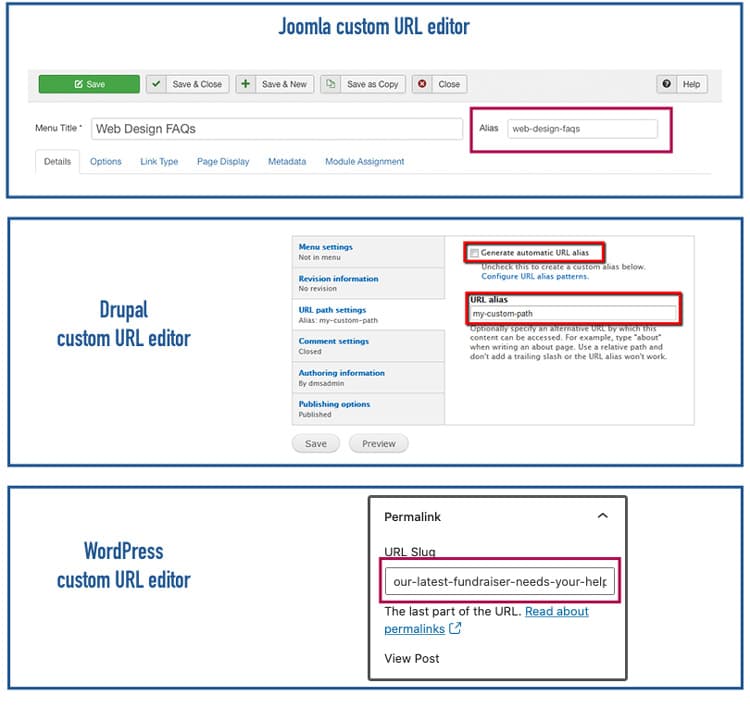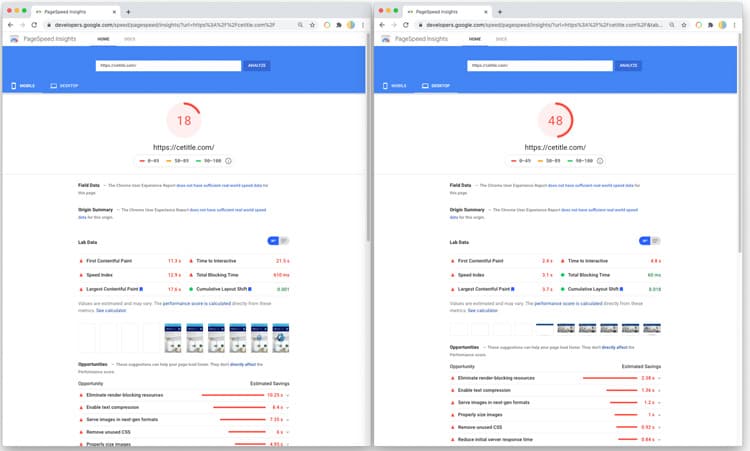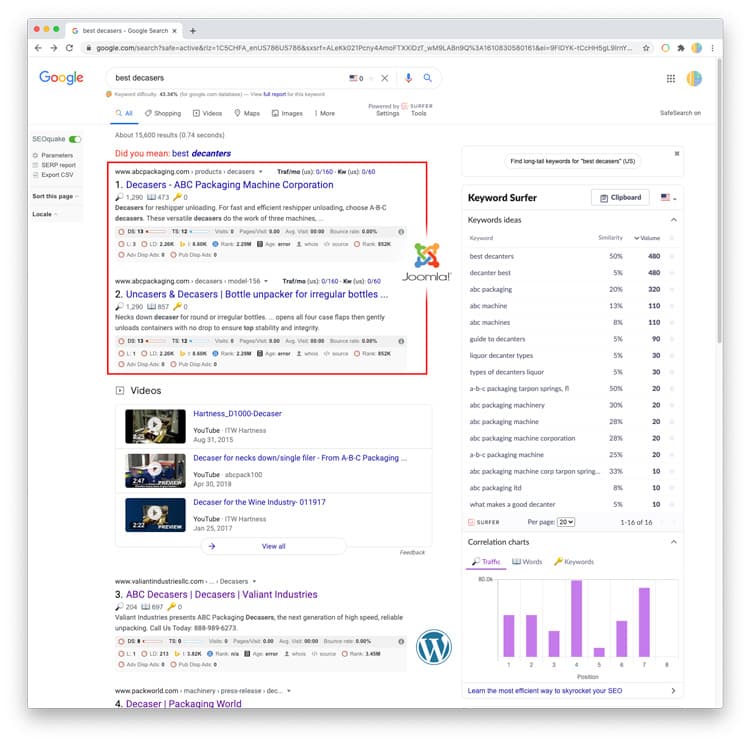10 Reasons Why WordPress Is NOT the Best CMS for SEO

Let's first explain what this article is. This is a direct response to an article I found published on SearchEngineJournal.com on January 26, 2020 titled, “Why WordPress is the Best CMS for SEO”. After reading the article I became rather angry. Angry at the fact that such a reputable online magazine such as SEJ would publish such an article. But even more angry at the lack of foundation for such a bold statement. Claims like this that are published on a platform such as SEJ have the potential of leading readers blindly due mainly because of the publisher's reputation.
- Table of Contents
Throwing No Shade
1) [CMS] Focuses on User Experience
2) [CMS] Allows Attractive Permalinks/URLs
3) [CMS] Makes Meta Data Easy to Manage
4) Optimizing Images for SEO Is Simple On [CMS]
5) [CMS] Won't Frustrate Users With Slow Load Time
6) [CMS] Is Optimized for Mobile Users
7) [CMS] Helps You Integrate Your Campaign With Social Media
8) [CMS] Has Awesome Plugins Made Specifically for SEO
9) [CMS] Is Easy to Integrate With Other Software Tools
10) [CMS] Has SEO-Friendly Themes
In Closing
Back Story
Throwing No Shade
I am by no means implying the WordPress is or is not the best CMS for SEO, I am merely pointing out the that the 10 reasons given by the author (who is a content writer, as I have found out) of that article are baseless. One could easily substitute any other CMS name in the title. “10 reasons why Joomla is the best CMS for SEO”, for example. Or Drupal, Craft CMS or others. Because of this, I will use [CMS] for each point. Anyone who is a fan of another platform other than WordPress can use their platform name in its place and see that it also works.
This is not a battle of the CMS platforms article. I happen to be a fan of Joomla but work with WordPress as well. They are both fantastic platforms, each with their inherent pluses and minuses. But that is NOT what this article is about. I will start and end my rant with this: SEO is platform independent. It is about content and strategy, not about which Open Source (or non Open Source) solution is being used. So, let me explain the 10 reasons why WordPress is not the best CMS for SEO using the 10 reasons given in the aforementioned article.
1. [CMS] Focuses on User Experience
All major CMS platforms do their best to provide a solid foundation that will allow developers and web designers to create the best possible experience for the end user. It isn’t necessarily the platform that bears the responsibility once web sites are designed and published. There are the “go-betweens” that grab the torch in this relay after the CMS is downloaded and before the end user gets to view the website. Whatever happens in that transition area is ultimately what produces the final user experience.
If they are an experienced web designer or developer they will, more often than not, understand the UX paradigm and create accordingly. If, however, there is an inexperienced individual at the helm, all hell can break loose. They may be looking for more form that function and try to implement all the bells and whistles at their disposal. And we all know what some of these templates and themes can provide in terms of bells and whistles. These can have a significant impact on user experience. Think of the individual adding a full-width 10-slide carousel in the hero position, rotating videos, photo galleries, all on the same page. I can add dozens more examples but you get the point. It is not the CMS that creates that website in the end, it is the CMS in the hands of the web designer that can make or break the site.
2. [CMS] Allows You to Create Attractive Permalinks
I can say definitively that Drupal and Joomla both offer the very same features, as do other systems. No one wants to see a URL with query strings, category, article or product IDs in them. I cannot speak for many Ecommerce platforms but these two provide the option to include SEF (search engine friendly) URLs.

3. [CMS] Makes Meta Data Easy to Manage
As a user of both Joomla and WordPress, this one really bothers me. With vanilla (out of the box) installations of both platforms side by side you will see the error in that statement. Joomla includes the ability to add a meta description on any article, or even any menu item, for that matter. With WordPress and Drupal you have to install a plugin or extension to gain this important SEO feature. But when adding the plugin or whatever 3rd party solution, they all provide that same feature. So how can one CMS be better than all because of that one feature, especially when it isn’t included in the installation?

4. Optimizing Images for SEO is Simple On [CMS]
The author points out the WordPress allows you to add alt tags to your images for SEO. Again, this is true for all major CMS platforms. The author then goes on to explain that you can resize your images, so page speed is not affected. While resizing your images can certainly help, they are not completely optimized after doing so. Image compression and image format have a lot to do with image optimization. Plugins and extensions are available for this task for all CMS platforms, if you needed one. I prefer to do my optimizing outside of the website. This way there is no need to add any additional plugins to an already file-heavy CMS.
5. [CMS] Sites Don’t Frustrate Users With Slow Load Time
I am not a fan of repeating myself but my goodness. All CMS platforms tend to add a great deal of code and bloat. This is partly due to the dependencies on external JavaScript and CSS files, data base integration, etc. The more bells and whistles you want to add, the more dependencies and bloat you may end up creating.
Plugins and extensions are available for all platforms that offer ways to lessen the footprint of your website. Whether it is minimizing the html, CSS and JavaScript, consolidating .js and .css files, gzip compression options and more. CDNs, which are also platform independent, offer yet another means of optimizing your load time.
Let’s not lose sight of the fact that these are Content Management Systems. The very idea behind these products is to allow the end user, or website owner, the ability to modify and maintain their own website. This can sometimes have negative results.
Consider the website owner who wants to add slide shows, videos, monstrous images and more. What they end up doing to a site that was delivered in good shape, visually and technically, can be damaging to the overall health of the website. This can result in frustrated users due to slow load time and other issues - regardless of platform.
6. [CMS] Is Optimized for Mobile Users
Responsive web design has been around for quite a number of years now. And any template or theme worth its salt in today’s world of web design will already be mobile friendly. It seems absolutely unfathomable that anyone would be developing a theme or template that is not ready for mobile use. Mobile users surpassed those of desktop users years ago and all CMS platforms and their savvy developers are well aware of this.
7. [CMS] Helps You Integrate Your Campaign With Social Media
Adding share buttons and feeds from social media channels to websites has been around for ages. WordPress is by no means the only one that offers this feature. When social media feeds first became available for websites it seemed everyone was jumping on that bandwagon. But this is, in my opinion, an ugly addition to a website with unnecessary code bloat and load time. It is a seldom offered feature in web design proposals these days.
8. [CMS] Has Awesome Plugins Made Specifically for SEO
There is absolutely no doubt that Yoast took the bull by the horns with this one. But if you think about it, with mother being the necessity of invention, it was born of necessity. WordPress did not offer any way to add meta descriptions or keywords (when keywords were relevant) so Yoast created the solution with their plugin. They did a fantastic job as this is by far the most popular plugin of the WordPress environment. It even allows the use of variables for titles and descriptions. Very cool. But did you know it also has a module for Drupal? Did you know Joomla also has a slew of extensions and components for SEO as well? Analytics, SEO, sitemaps, etc. THEY ALL DO.
It’s fine that some people like to use these plugins to get a good score, or a little green light telling them their page passes the mustard. But again, SEO is about content and strategy, not about CMS platforms or plugins, though they can assist in many ways.
9. [CMS] Is Easy to Integrate With Other Software Tools
Adding plugins or extensions to your CMS for 3rd party integrations of CRMs, email marketing platforms etc. is available for all platforms, not just WordPress. Some templates and themes have particular email and CRM platforms integrated our of the box. All you need to add is you license key or API.
10. [CMS] Has SEO-Friendly Themes
The most mind-boggling sentence of the author’s entire post reads as follows:
“When you use WordPress, you never have to worry about optimizing your site design for SEO yourself. Simply choose an SEO-friendly theme, and you’re on your way to attracting those spiders to your site!”
It sounds an awful lot like the very misguided “Build it and they will come” mentality. Spiders crawl websites anyway. The author explains that meta data and relevance are not the only parameters that the Google bots are searching for - they are seeking good web design as well. While spiders can certainly crawl websites and detect semantics, syntax, language, etc., last I knew these little creatures were inanimate algorithms that cannot “see”. Good web design, as subjective as it is, is in the hands of either the theme developer, web designer or in most cases, both. YooTheme, Genesis, RocketTheme, Avada, and the likes, all provide excellent foundations for great looking websites. But when in the wrong hands, they can become eyesores at the bottom of a 110,000,000 SERP result.
To provide proof in the pudding, consider the screen shots below. This website is using the ever-popular Hello theme from Elementor. You can clearly see that the folks who put the website together are not considering much more than completing the project and getting paid. Aside from the dismal scores that were earned in Google Page Speed test, a quick technical audit revealed a number of other glaring issues that can directly affect SEO: 115 missing alt tags, a home page that is 3.9MB, 20 internal broken links, meta descriptions pulled from body copy and other such problems.

As stated earlier, tools such as Elementor provide a good foundation for a great website, in the right hands.
How do you think this website is going to do in the SERPs with queries related to their very competitive market space? This can happen with WordPress, Joomla, Drupal, Craft or any other platform. For the author to say “Just pick an SEO-friendly theme and you are good to go" is woefully incorrect and irresponsible in my humble opinion.
The Sheer Numbers of WordPress websites
In her closing paragraph the article author provides a screen shot from a study done by Gotcha SEO. This image lists the top CMS platforms that were returned in certain searches. Their data was published in an article coincidentally titled, BEST CMS for SEO.
When you take into account that WordPress is the most popular CMS on the planet, powering approximately 39% of the internet, (according to builtwith.com), it stands to reason that it will return the most CMS results in a SERP. The authors of the study even mentioned that the top results of their searches were not even using a CMS. The study was not exhaustive so it should be taken with some salt at least.
But when considering a website that was built with any other platform, and SEO optimized well for its market, any platform can be at the top. Consider the following example. ABC Packaging is leading manufacturer of packaging machinery around the world. Their website was built using Joomla. When searching for “best decaser”, a typical machine in that industry, the results are telling.
We can all produce many examples of SERPs with their favorite CMS at the top. And that alone should tell you something that the original author does not seem to comprehend.

In Closing
As I mentioned, I am also a fan of WordPress. It has done a fantastic job at providing a solution for web design and has marketed the platform beautifully. To think that 39% of the internet is built on the platform is incredible.
Even Google has their own WordPress plugin. The SiteKit plugin allows WordPress website owners to install Google products in the backend of the installation. Website owners can install Search Console, Google Analytics, Page Speed Insights and even AdSense. When the world’s leading search engine develops a plugin for the leader in CMS platforms, that speaks volumes. I recently attended the SMX Expo in December 2020 and in one session heard someone say that Google has their own development team continually working on WordPress “stuff”. Whether that is true or not is complete hearsay at this point.
It’s not what you have to use, it’s how you use what you have.
That is what I have been telling my children for years. If you hand a firehose to a professional firefighter and then give the same hose to a novice gardener, the results will vary greatly. Hand a Joomla site over to a professional SEO and a WordPress site over to a novice web designer and see what happens with regard to SEO. I will put my money on the Joomla site in that instance every time.
I will repeat again that I do not believe that SEO is about any platform or plugin. It is about content and strategy. If someone has some technical study or information available that unequivocally shows why a particular CMS is better than any other for SEO, and not just an opinion, I invite you to contact me to let me know. I would be happy to write a follow-up with this information.
I completely understand wanting to rave about something you like or are familiar with. But saying something is better than another and using reasons that are universal is not a solid argument. That’s like saying strawberry ice cream is best because it is cold, it tastes good, it looks good in your bowl, etc. Chocolate ice cream does all of the same things.
To say something is the best you need to provide unique reasons that are not shared by its competitors. Otherwise it is simply an opinion and nothing more than flag waving. So do yourself and your clients a favor by providing the best CMS solution for their situation, not because it is popular.
- Why This Was Written
How and why was this article written? After speaking to a prospective client who was looking for a website redesign a little research was in order. Their current website was created with WordPress and was an absolute mess. I inquired as to why they chose WordPress. He replied that he didn’t know, although he just wanted to make sure he could add content to his blog and make simple changes to other parts of the website. So, in short, all he needed was a CMS.
I then asked whether he had heard of other CMS platforms such as Joomla. I explained what Joomla was, its benefits and so-forth. He then added that every SEO he spoke with asked him if his website was using WordPress. When he replied in the affirmative, they all said “good!”. This left him believing, and millions of others who hear something like that, that WordPress was the answer.
This immediately told me either or both of two things: 1) that the SEOs were used to and wanted to use Yoast or some other WordPress plugin; and 2) that they knew how to use WordPress themselves. SEOs will provide instructions on how to update your website for SEO content or offer to do it themselves, as part of their proposal. So, understanding the platform, especially for those who do not know HTML, is pinnacle.
I then went on my usual spiel about how platforms and plugins should have nothing to do with serious SEO and how it is all about content, strategies, etc. Once the phone call was over, I figured I’d do another search myself to see what others were saying as to why they may have thought WordPress was the best CMS for SEO. All I found were opinions, including the article mentioned above. Nothing technical, mind you. Then put fingers to keys and tapped out this post. For what it's worth.
Web Design, Content Management System, Joomla, WordPress, Search Engine Optimization (SEO)